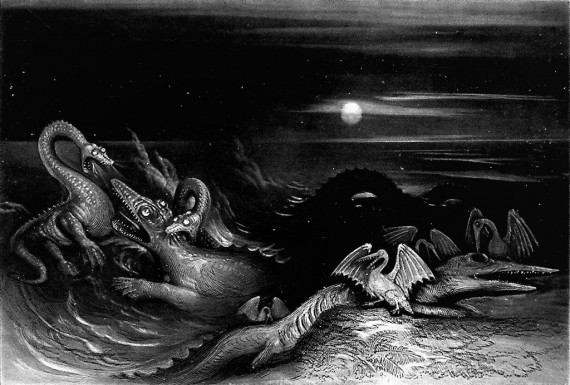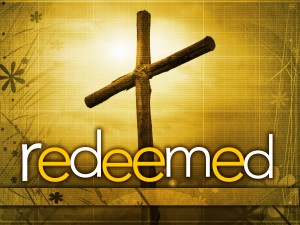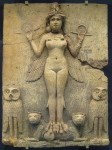Is there something in your life you are ashamed of? If you are like most people, there are probably a multitude of such things.
Maybe it is something evil that happened to you when you were younger. Maybe it is some addiction or temptation which you fall to almost every day.
By looking at some shocking truths from Genesis 1:21, we see that God doesn’t want to get rid of those things in your life. No, instead, God wants to redeem them. To turn them around to be used for His glory.
Listen to this episode of the One Verse Podcast to see what I mean.

The Text of Genesis 1:21
Genesis 1:21. So God created great sea creatures and every living thing that moves, with which the waters abounded, according to their kind, and every winged bird according to its kind. And God saw that it was good.
In this discussion of Genesis 1:21 we look at:
- Why Moses uses the word bara (“to create”) in Genesis 1:21.
- The meaning of tannin as “monsters” in Genesis 1:21.
- The religious myths about sea serpents from Babylon, Canaan, and Egypt
- What the rest of Scripture says about sea serpents.
- The theological truth Moses was making by saying that God created the
- The theological truth Moses was making by calling the tannin “good.”
- Why God wants to redeem the evil that has happened to you and turn it around for good.
Resources:
- Logos Bible Software
- Ancient Seas Monsters
- Eight Reasons Genesis 1 Does Not Teach Creationism – Spencer Boersma
- Fretheim, NIB: Genesis – Amazon or CBD
- Gibson, Genesis – Amazon or CBD
- Hamilton, Genesis 1–17 – Amazon or CBD
- Hasel Article on Genesis 1
- Kidner, Genesis, Amazon or CBD
- Ross, Creation & Blessing – Amazon or CBD
- Sailhamer, Genesis Unbound – Amazon
- Sarna, Genesis – Amazon or CBD
- Waltke, Genesis, Amazon or CBD
- Walton, Zondervan Illustrated Bible Backgrounds – Amazon or CBD
- Walton, Lost World of Genesis One, Amazon or CBD
- Wenham, Genesis – Amazon or CBD
- Subscribe and Leave a Review on iTunes
Downloadable Podcast Resources
Those who are part of my online discipleship group may download the MP3 audio file for this podcast and view the podcast transcript below.
You must join a discipleship group or login to download the MP3 and view the transcript.
Thanks for visiting this page ... but this page is for Discipleship Group members.
If you are already part of a Faith, Hope, or Love Discipleship Group,
Login here.
If you are part of the free "Grace" Discipleship group, you will need to
Upgrade your Membership to one of the paid groups.
If you are not part of any group, you may learn about the various groups and their benefits here:
Join Us Today.

Do you like learning about the Bible online?
Do you like learning about Scripture and theology through my podcast? If so, then you will also love my online courses. They all have MP3 audio downloads, PDF transcripts, quizzes, and a comment section for questions and interaction with other students.
If you want to deepen your relationship with God and better understand Scripture, take one (or all) of these courses. They are great for personal study or for a small group Bible study.
You can see the list of available courses here, and if you join the Discipleship group, you can take all the courses at no additional cost. Go here to learn more and join now.


![[#15] Genesis 1:21 – Redeeming the Sea Serpents](https://redeeminggod.com/wp-content/uploads/2015/09/One-Verse-Podcast-Jeremy-Myers-150x150.jpg)

 Welcome to the new website: RedeemingGod.com
Welcome to the new website: RedeemingGod.com
 For right now, people can still get Skeleton Church for free by subscribing to my email newsletter. This might change in the future, but it might not. I don’t know if I will publish more books in the future or not. I suspect I will, but I don’t know when, I don’t know what, and I don’t know how. If I do publish more books, and I am able to send them out for free to people who get my blog updates, I will do so.
For right now, people can still get Skeleton Church for free by subscribing to my email newsletter. This might change in the future, but it might not. I don’t know if I will publish more books in the future or not. I suspect I will, but I don’t know when, I don’t know what, and I don’t know how. If I do publish more books, and I am able to send them out for free to people who get my blog updates, I will do so.
 So someone left a one-star review of
So someone left a one-star review of  This does not mean that Genesis 1-2 is myth, or that God didn’t really say the things He said in Deuteronomy, or that the Jewish feasts have no significance or meaning.
This does not mean that Genesis 1-2 is myth, or that God didn’t really say the things He said in Deuteronomy, or that the Jewish feasts have no significance or meaning.




 Have you ever seen t-shirts that say “God’s Gym” or “Abreadcrumb & Fish”? I’ve seen t-shirts with the Guitar Hero design, but on closer inspection, it says “God is my Hero.” Similarly, there are “Amazing Grace” t-shirts that look like the “American Idol” logo, and I have seen shirts with the superman logo, but with “JC” instead of “S.” I’ve seen a Staple’s “Easy” button with the word “Jesus” on it instead.
Have you ever seen t-shirts that say “God’s Gym” or “Abreadcrumb & Fish”? I’ve seen t-shirts with the Guitar Hero design, but on closer inspection, it says “God is my Hero.” Similarly, there are “Amazing Grace” t-shirts that look like the “American Idol” logo, and I have seen shirts with the superman logo, but with “JC” instead of “S.” I’ve seen a Staple’s “Easy” button with the word “Jesus” on it instead. The simple fact that most people don’t know the origins of the word “Easter” shows that a shift has happened over the past 2000 years. The day has been redeemed. Though Easter is a commercialized holiday, most people still associate it with Jesus and His resurrection from the grave.
The simple fact that most people don’t know the origins of the word “Easter” shows that a shift has happened over the past 2000 years. The day has been redeemed. Though Easter is a commercialized holiday, most people still associate it with Jesus and His resurrection from the grave.